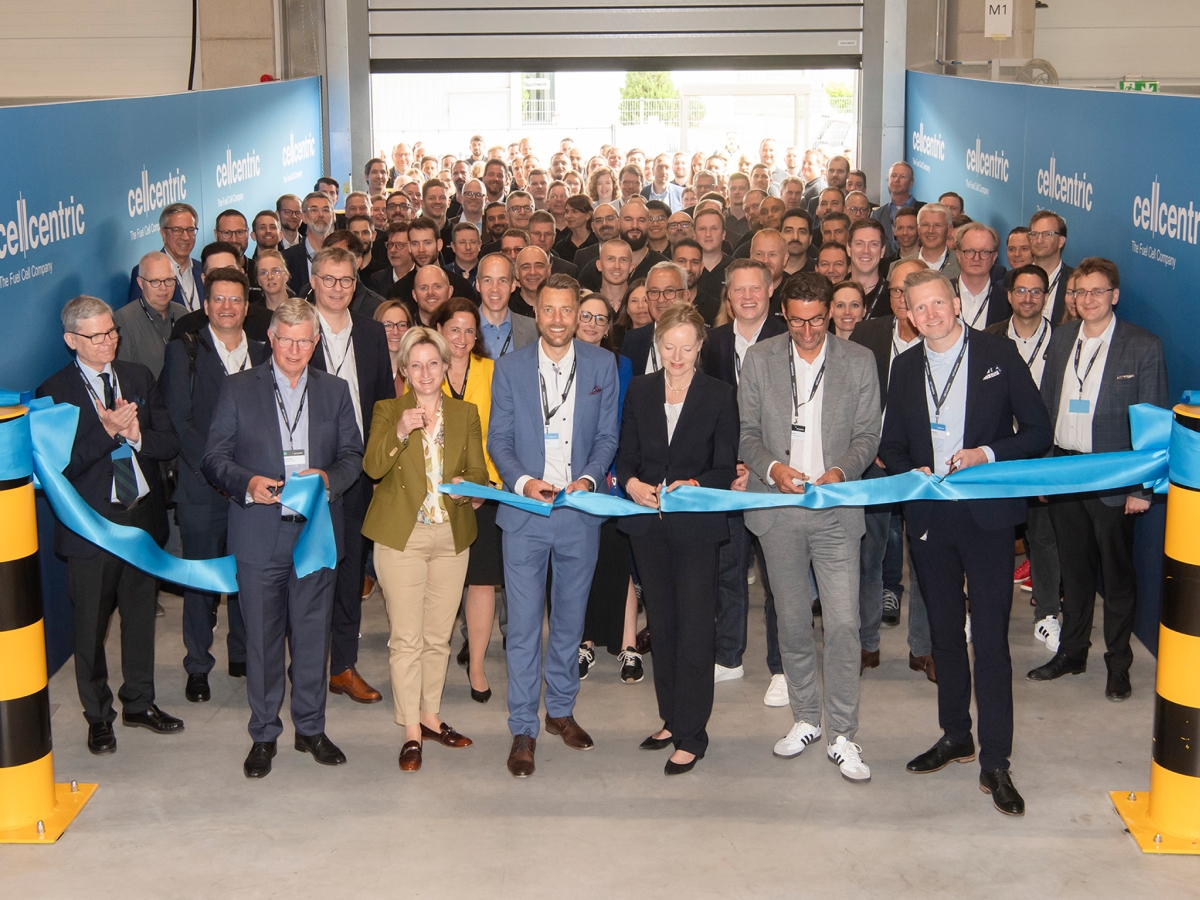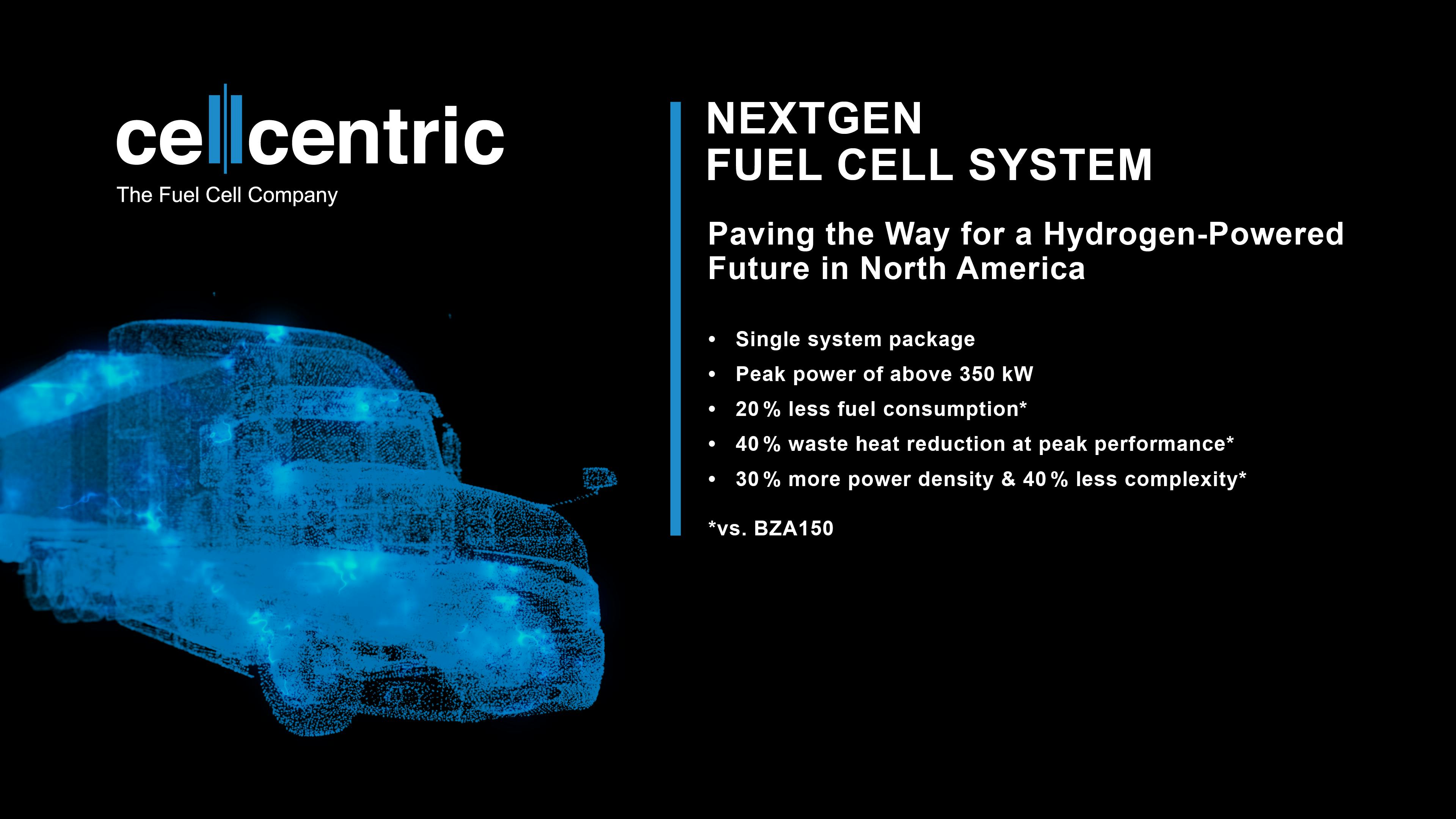cellcentric starts pilot production of fuel cell systems

Esslingen/Germany – A key milestone for the climate-neutral transport of tomorrow: cellcentric inaugurates pilot production for fuel cell systems at the Esslingen-Pliensauvorstadt site, taking another significant step towards large-scale production. cellcentric is working towards supplying fuel cells on a large scale by the end of the decade, when fuel cell powered long-haul heavy-duty trucks are predicted to become a key technology for sustainable transportation.
cellcentric’s goal is to develop, produce and distribute fuel cell systems on a large scale in the German state of Baden-Wuerttemberg that achieve the best possible total cost of ownership (TCO) in the highly competitive transportation industry. In addition, cellcentric intends to cover the entire fuell cell ecosystem – from the product itself to maintenance and recycling at the end of its life cycle.
“Fuel cell technology is a well-proven solution for CO2-neutral long-distance heavy-duty transportation. However, it has not yet been produced on an industrial scale, which is precisely the key to achieving economies of scale, optimizing the total cost of ownership (TCO) and putting cellcentric in a solid competitive position in the long term,” says Lars Johansson, Chief Commercial Officer and Chief Organizational Officer of cellcentric GmbH & Co. KG. “The opening of our pilot production facility in Esslingen today is not the end point of large-scale production, but rather the blueprint for the next step. In the coming years, we will continue to consistently drive forward the industrialization and scaling of production of fuel cell systems at the Weilheim site,” explains Johansson.
On June 20th, Lars Johansson and the cellcentric management team welcomed numerous guests from politics, business, associations, science and research to the opening ceremony, including Baden-Wuerttemberg state ministers Dr. Nicole Hoffmeister-Kraut (Economics, Labor and Housing) and Thekla Walker (Environment, Climate and Energy) as well as Heinz Eininger, the district administrator of Esslingen, and the mayors of Esslingen, Matthias Klopfer, and Weilheim, Johannes Zuefle.
Fuel cell systems for sustainable heavy goods transport on the way to mass production
cellcentric’s modern production facility in Esslingen-Pliensauvorstadt is the ideal location to produce fuel cell systems. More than 100 employees have over 10,300 square meters of production, logistics and office/administration space at their disposal. The property in the immediate vicinity of the federal highway 10 is part of the Esslingen industrial park greenfield.
In a next step, cellcentric will establish the necessary production processes at the site to prepare for the start of a large-scale production of fuel cell systems with a high degree of vertical integration. With complete production at one location and a high level of automation, the company secures stable long-term economic development.
The complete process chain comprises the following production steps:
- Ink Mixing & Coating – Precise mixing of the various raw materials to produce a dispersion for subsequent roll coating.
- Membrane Electrode Assembly (MEA) – The roll-to-piece process assembles and puts together the components of the individual cell in a highly automated process in a cycle time suitable for large-scale production.
- Sealing – Injection molding process applies seals in fully automated process.
- Stacking – Automated stacking of the complete fuel cell stack.
- Assembly – All modules of the fuel cell system are assembled according to automotive mass production standards.
- Inline Quality Testing – Strict automated inspection and quality control protocol that accompanies all steps in the production process to identify and rectify faults quickly and reliably. It ensures continuous compliance with all quality requirements until the product is ready for delivery.
Fuel cell ecosystem beyond the product life cycle
In addition to the development and production of fuel cell systems for heavy-duty transportation, cellcentric will create a complete ecosystem around the highly complex assemblies. This will provide customers with products of unique quality while enabling seamless integration of the drive solutions into the vehicle management system. Moreover, a comprehensive service package including all maintenance and repair services will ensure that maintenance-related downtimes and unforeseen failures or breakdowns are reduced to a minimum for users – an important criterion in the transport industry for the best possible utilization of vehicle capacity.
Ultimately, cellcentric is planning an environmentally friendly return of the fuel cell systems at the end of their life cycle, in line with the company’s commitment to the highest possible level of sustainability in all corporate processes. Based on the concept of the circular economy, cellcentric’s cyclical approach aims to use resources, materials and products as considerately and sparingly as possible in four steps:
These include the Reuse of decommissioned fuel cell systems for other applications with a lower requirement profile, Refurbishment, a reconditioning and recycling of fuel cell systems for a longer useful service life, Remanufacturing – the total overhaul to refurbish and make the systems as good as new again -, and the recovery of raw materials and reuse in new fuel cell production through Recycling.
Sustainable propulsion technology for global heavy-duty transportation
In May 2024, cellcentric presented its smaller, more powerful and efficient NextGen fuel cell system for sustainable hydrogen-powered long-haul trucks for the first time at the ACT Expo in Las Vegas, USA. In addition, with the BZA150 fuel cell generation, the company has a close to series production and already practical pilot product that has been successfully tested by the truck manufacturers Daimler Truck and Volvo Group in demanding field tests. Series production of the NextGen fuel cell system is scheduled to begin at the end of the decade.
Further pictures are available for download at:
https://cellcentric.net/en/media/
About cellcentric
cellcentric develops, produces, and markets fuel cell systems for use in heavy-duty commercial vehicles as the focus as well as for other areas of application outside vehicles. cellcentric is a joint venture founded in 2021 between Daimler Truck AG and the Volvo Group. The company utilizes the know-how and extensive experience gained from decades of developing fuel cell systems by its predecessor companies. cellcentric’s goal is to become a leading global manufacturer of fuel cells and thus making a contribution to climate-neutral and sustainable transportation by 2050. More than 520 highly qualified employees are driving our state-of-the-art fuel cell technology forward. They work in interdisciplinary teams at our sites in Nabern, Stuttgart-Untertuerkheim, Esslingen (Germany) and Burnaby (Canada). Around 700 individual patents granted, underline the company’s leading role in technological development.
Press contact
+49 (0)175 5337198
christian.kleinert@cellcentric.net

